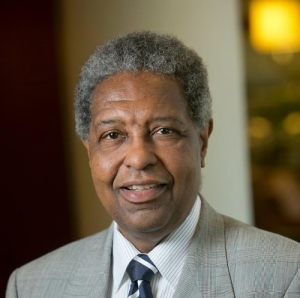DURHAM, N.C. (MAY 17, 2022) — The Samuel DuBois Cook Center on Social Equity at Duke University is pleased to announce the selection of William A. “Sandy” Darity Jr. to be a Radcliffe Institute fellow for the 2022-2023 academic year. Darity, 69, the Samuel DuBois Cook Professor of public policy, African and African American studies, and economics at Duke, was chosen for one of the Radcliffe Institute’s 50 fellowships. The incoming Harvard Radcliffe Institute fellows come to Cambridge from 14 different countries, 30 different colleges and universities and a huge variety of backgrounds, from engineering and computer science to the creative arts. In a decade of change and challenge, the 2022-23 fellows at Harvard Radcliffe Institute will bring forward-looking projects and possibilities to Radcliffe this fall — from a robotic fish that unobtrusively gives biologist an unfiltered view of aquatic behavior, to real-time statistical algorithms fueled by smart devices to provide interventions and guidance to those suffering from substance abuse, mental illness or heart disease – all intent on healing, helping and processing changes and challenges now, and for decades to come. The Harvard Radcliffe Institute Fellowship Program, now in its 22nd year, offers scholars and practitioners in the arts, humanities, journalism, sciences, and social sciences a chance to pursue their latest passions. A total of 1,111 fellows have gone through the program since the program was founded in 1999. As the 2022–2023 Katherine Hampson Bessell Fellow, Darity will pursue an individual project in a community dedicated to exploration and inquiry at Harvard’s institute for advanced study. Specifically, Darity will write a manuscript that explores the theoretical framework of stratification economics—a comparatively new subspecialty in the wider field of economics that seeks to explain intergroup inequality—along with its empirical foundations, antecedents, and innovative implications for the analysis of immigration, macroeconomic analysis, wealth disparities, educational inequalities, and discrimination. “So many of us are inspired in this moment to pursue new scholarly approaches and innovative solutions to the pressing challenges we face, and this year’s fellowship class includes an incredible range of important projects,” said Tomiko Brown-Nagin, dean of the Radcliffe Institute for Advanced Study, Daniel P. S. Paul Professor of Law at Harvard Law School, professor of history in the Faculty of Arts and Sciences, and chair of Harvard’s Presidential Committee on Harvard & the Legacy of Slavery. “I am looking forward to all they accomplish. I know from firsthand experience how meaningful and generative a Radcliffe fellowship can be, and I am thrilled to welcome this talented new cohort to campus.” While in residence, fellows at the Radcliffe Institute present lectures and exhibitions to the public, participate in cross-disciplinary study groups, and work closely with undergraduate Harvard students who serve as research partners. The full list of fellows is online. ………………. About the Radcliffe Institute for Advanced Study at Harvard University The Radcliffe Institute for Advanced Study at Harvard University—also known as Harvard Radcliffe Institute—is one of the world’s leading centers for interdisciplinary exploration. We bring students, scholars, artists, and practitioners together to pursue curiosity-driven research, expand human understanding, and grapple with questions that demand insight from across disciplines. For more information, visit www.radcliffe.harvard.edu. ###

